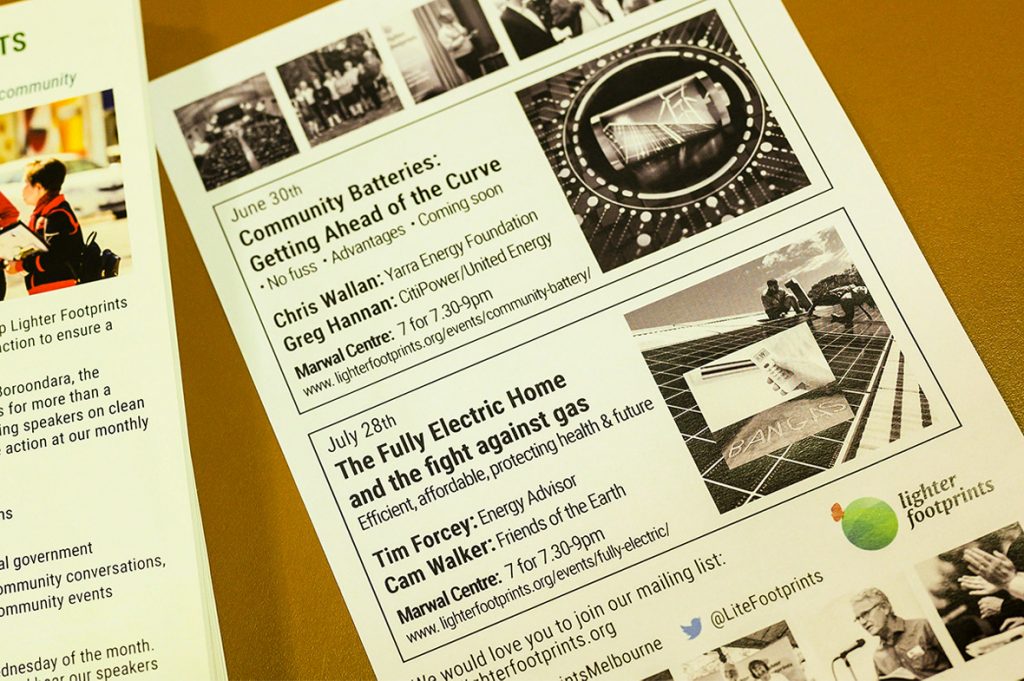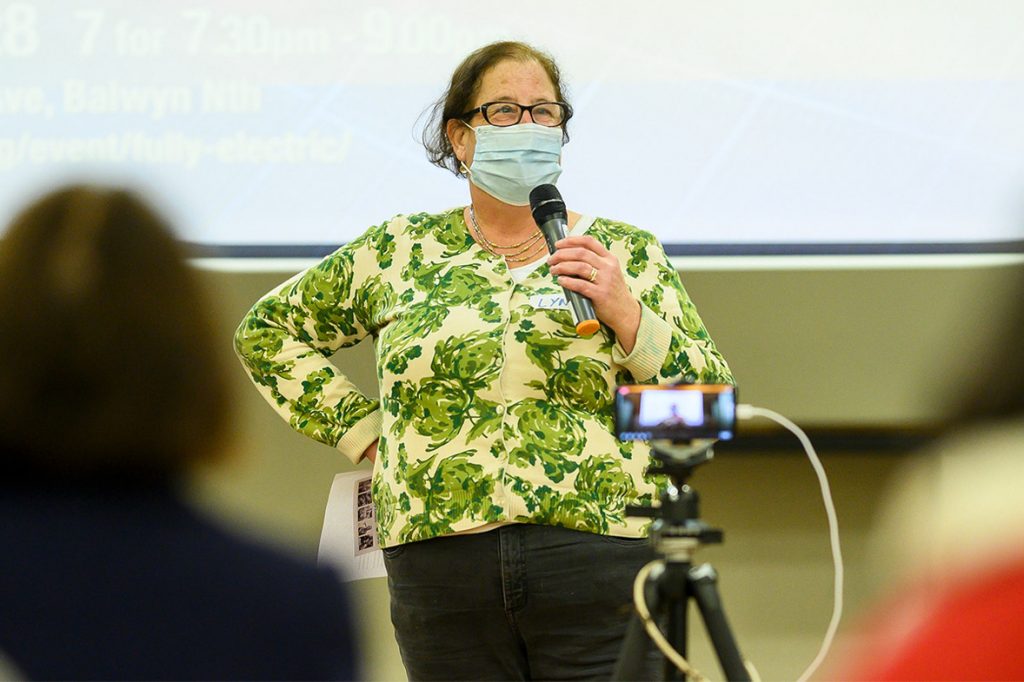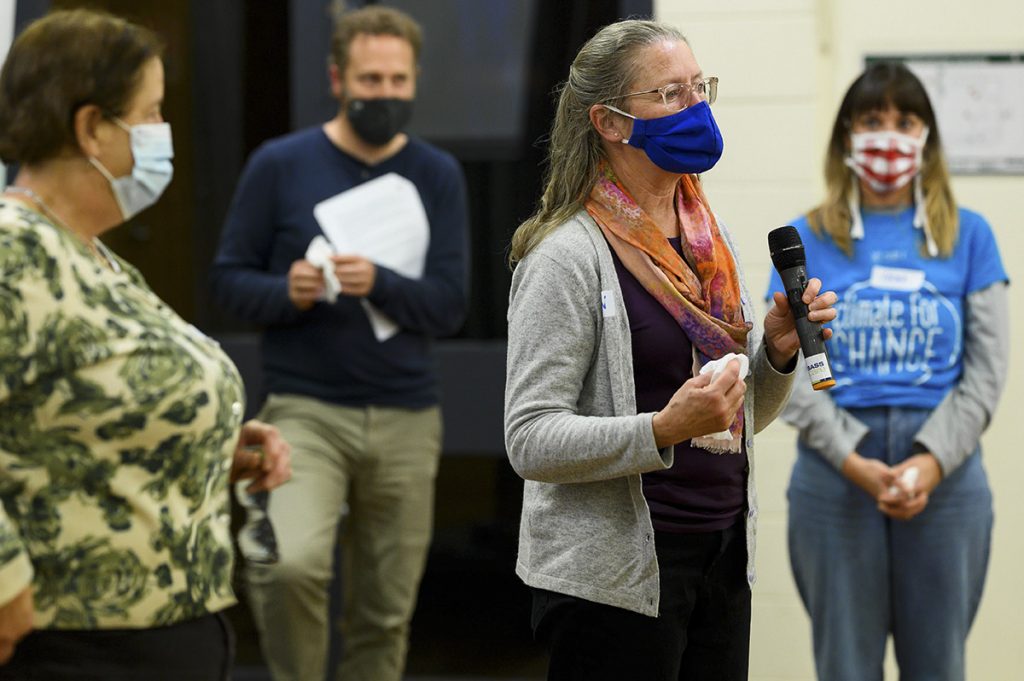Lighter Footprints Co-Convenor Mick Nolan was very pleased that we were all finally able to meet together in person. “It was so good to get out to the Guide Hall and speak to people face to face.”
“The C4C event was a buzz!” said Alison Wright, enjoying meeting familiar faces in person, after over a year of online.
This is the meeting that almost wasn’t – with full COVID lockdown only days away, we are very grateful our members and guests for coping with the last minute disruption, and being patient with the change to two meetings in two venues.
A number of people worked hard to hit the phones and organise this venue shift, with Lynn at the Marwal Centre in North Balwyn, with Mike McEvoy and Emma from Climate 4 Change, and Julian Atchison ably managing the livestream for our online audience. Over at the Guide Hall in Canterbury, we were grateful to have Belinda, Deb and Lisa from Climate 4 Change facilitate 2 separate discussion groups.
You can check out our
Facebook Album here, and listen to MikeMcEvoy on
Facebook Live here. Mike starts speaking about two minutes in, following an introduction by our Co-Convenor Lynn Frankes.
Alison Wright on “why am I training to be a C4C facilitator”
Although Alison has been concerned about the climate crisis for a while, she told us that recently has she felt encouraged to step up and do more, even though she is a relatively new volunteer. Alison says that the Climate for Change model makes sense. As a facilitator she will be meeting people on their climate action journey and encouraging them to take the next step.
“I am doing it for my kids and their generation; they will be inheriting the situation we and those before us have created. While I have time, energy and ability, I want to do everything I can to push those in positions of responsibility to accept the science and act: for the climate, for the environment, for the planet, for the next generation and their next generation.”
Climate Conversations are an effective tool for listening and creating change
Mike McEvoy explained how the value of gentle facilitated climate conversations, where people can absorb new information from people they trust. Climate for Change works to create the social climate in Australia for effective action on climate. You can more about C4C here.

Mick Nolan commented on watching the C4C video: “I found myself at the point of not wanting to see any more of the worst of the effects and anxious to get to what we must do. This was a common response in the discussion immediately after the video.”
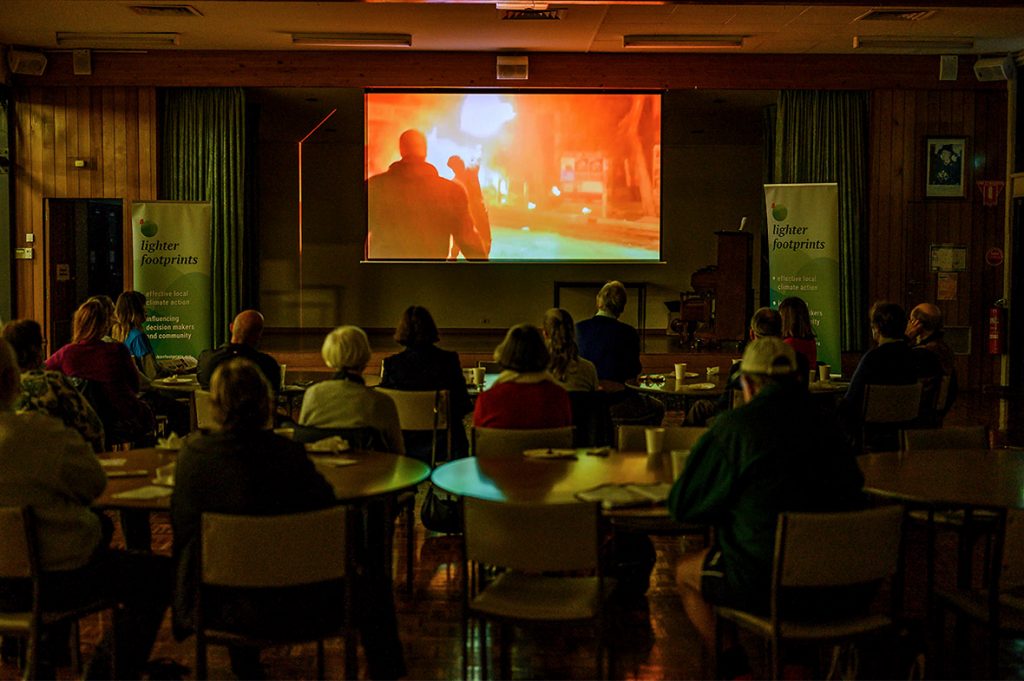
We then were guided through a conversation about how we can bring about the necessary change
1) in our own lives
2) in our Community
3) in the way we invest and the businesses and companies we use
4) by engaging our MP’s.
Mick says that the group discussion initially focussed on the things we can do on the home front: ideas discussed included “more walking and bike riding, heat pumps for hot water, and planting trees”.
Alison enjoyed the conversations: “the C4C format provides the opportunity for an inspiring and informative discussion about what each of us can do in terms of climate action. It shows which actions have the most influence, and which are likely to have the most impact on decision makers. The discussion almost leads itself, with a little guidance from the facilitator.”
The value of collective action
Mick Nolan explains that the group discussion then moved on to an understanding there of the practical limits on effects we can have by acting alone, in our own sphere. “Individual changes in our own lives will not be quick enough in this ‘the critical decade’ to stop the overheating of the planet”, he said. “The systemic way to bring about change is to get policies and regulations and legislation sorted out. And the people who can do this are the politicians. Our elected representatives”.
Mick felt encouraged by the conversation. “I came away with a stronger understanding of the need to meet with MP’s, or to write to them or phone their offices. And not to be discouraged if I am headed off by protective staffers. The message gets through, and the weight of numbers has an effect. MP’s are people. They fundamentally want to do the right thing in theory, and so we must bring about the best in them by telling them what we want. Unapologetically, clearly and consistently.”
“We do not have to be the scientific experts or have all the solutions”, Mick explains. “They have bureaucrats and advisors for that.” What we can do is to keep our politicians focussed on the needs of the community: “we need them to act on climate, consistent with a world that is kept below 1.5 degrees C warming”.
What we can do next:
Find out more about about ‘Climate for Change’
Climate for Change’s mission is to create the social climate in Australia for effective action on climate change. Learn more about what we do here, what you can do about climate change here.
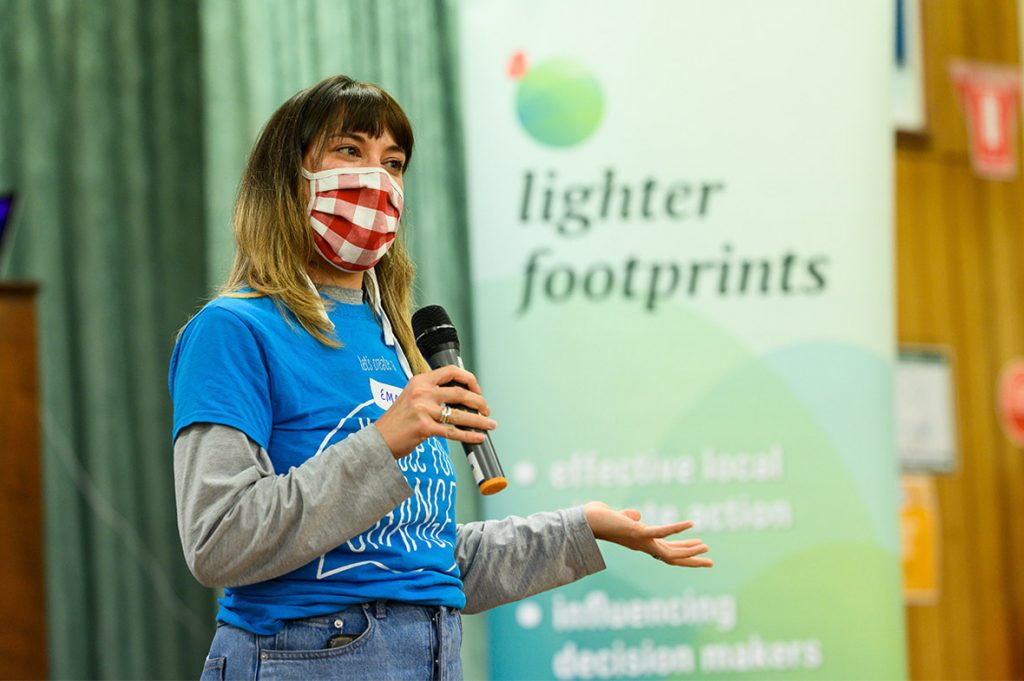
You are welcome to look through Climate for Change’s high quality conversation guide, with tips on how to approach people who are at different stage on their journey to climate awareness. Climate for Change’s research shows that these conversations are effective in reaching out to new audiences.
Join a Conversation or support our new Climate Conversations Working Group
There will be new conversations happening as soon as we can do this safely, will keen interest from our May meeting, so we would love you to register your interest – you can do that by ringing or texting Alison Wright on 0427 340 503 or Carolyn Ingvarson on 0411 115 186. You are also welcome to call them if you simply just want to find out more about being involved in climate conversations, or if you would like to volunteer for our new Lighter Footprints Climate Conversations Working Group.
Carolyn Ingvarson says she has decided to take up training as a facilitator with C4C with a view to working with our members in a different way. “Gathering round a table, with some food, to talk with our members and their friends, provides an additional way to get close to the issues that people struggle with. Experts at our monthly meeting do provide many answers, but these smaller more intimate meetings, offer opportunities to deal with concerns and questions in a way that points to next steps to be taken. And they can happen more than once if the group wants that. I’m hoping that many of these groups will begin to spread across our community.”
As Alison says, “the goal is to reach beyond our immediate contacts; our neighbours, our friends not yet involved in LF, our workmates and their friends. I think the C4C model will work; it provides plenty of ideas on taking the next steps.”

Join one of our working groups
Although Lighter Footprints is most well known for our monthly meetings with high quality speakers on topics of interest, a lot of our action and advocacy happens in our working groups, including the Local Government Working Group – submissions and solutions at the local level, Meeting with MPs, the influential Energy Transitions Group headed by David Strang, and our very successful Letter Writing Group under Ray Pecks tireless aegis, and various support groups. You can find out more and indicate your interest in our website Take Action page here.
Come to our next monthly meetings
We would love to see you at our upcoming meetings – Community Batteries: Getting ahead of the curve on June 30, and the Fully Electric Home and the fight against gas on July 28th, both at the Marwal Centre, North Balwyn. (The event is scheduled to be live, but if COVID restricts that we will advise any change to ZOOM).
See Flyer Leaflet graphic below.
